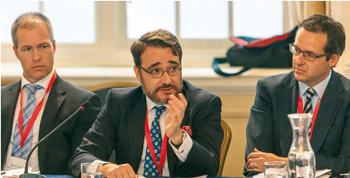New ruling on licensing for construction projects – pbbr
The recently published Government Ruling nr. 113/2015, dated 22 April, identifies the elements needed for instructions related to several procedures foreseen in the legal framework for the licensing of urban and construction operations – notably construction, reconstruction, modification, conservation, demolition or infrastructure works, or other urban procedures, such as plot divisions. The legal framework (the RJUE) corresponds to Decree-Law nr. 555/99, as amended on numerous occasions – most recently in September 2014 – which came into force in January 2015.
This new ruling basically approves the list of elements that have to inform several types of licensing procedures, as well as the conditions for their respective presentation, and also the models of the declarations of project participants.
It would be a painful exercise to describe in detail such rules. But what is relevant to emphasise is that the recent modifications of the RJUE and its accessory regulations were all driven by the intention to promote the simplification of the correspondent framework, aimed at reducing the delays of licensing procedures and eliminate “grey” zones that could only favour inefficiencies of the licensing entities and procedures. The effort towards simplification is also accompanied by the correlative enforcement of the liability of the entities which are the authors of the projects and submit the procedures for approval to the official entities.
Any lawyer who has in the past assisted international promoters or investors knows the nightmare of explaining to them a system which did not work in an efficient, fast and predictable way. The new RJUE and accessory regulations allows us to say that things are clearly changing, and the above Government Ruling develops a particular aspect of the aforementioned simplification process. Other relevant government rulings are still to be approved, including the rules applicable to a unique electronic platform for the delivery of all the documentation and projects instructing each procedure.
But there is clearly a political and legislative drive towards simplifying such a framework and making it more predictable, namely in terms of delays applicable either to approvals and non approvals.
Such predictability is crucial to bringing confidence to the real estate market, increasing development and investment decisions, namely among foreign investors, and the recent years have shown us that the country needs more investment, both from inside, and more importantly from the exterior. The same applies to tax rules applicable to real estate operations. In this aspect, it is true, a lot has still to be done to bring more simplification and predictability to investment decision making.
The experience of the introduction of the new RJUE rules and accessory regulations is positive and it seems to have changed the perception of developers and investors in the real estate business. The modified framework seems also to be modernising the practices of official authorities, which were used beforehand with a much more formal and complicated legal structure. As always, that is an ongoing process. But in general terms, delays in approvals have been reduced.
That is also clearly perceived when we explain the new Portuguese ruling to foreign clients. Such an exercise is no longer as painful for a Portuguese lawyer, when compared with the past. And you can sense this when dealing with foreign investors used to friendly investing environments – and this is what Portugal must become.
Pedro Pinto is a partner at Pbbr and can be contacted at pedro.pinto@pbbr.pt












